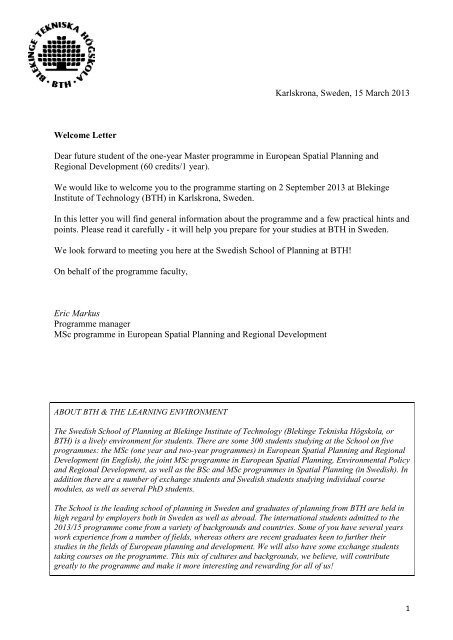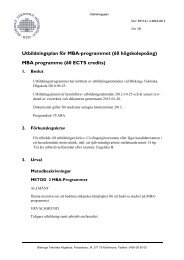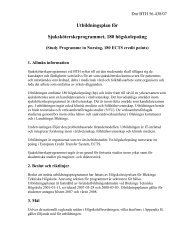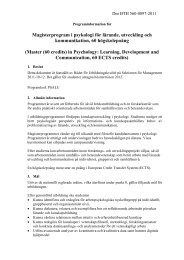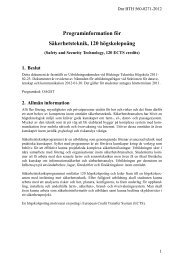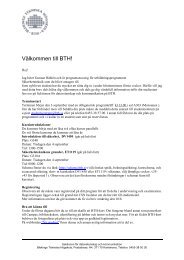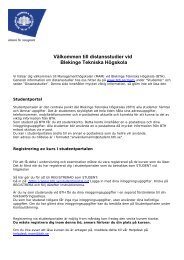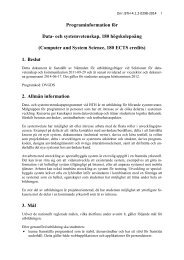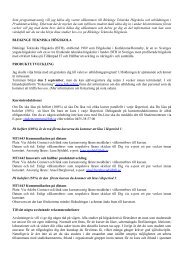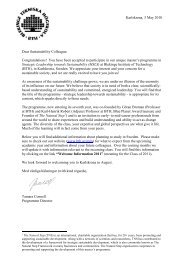letter - Blekinge Tekniska Högskola
letter - Blekinge Tekniska Högskola
letter - Blekinge Tekniska Högskola
Create successful ePaper yourself
Turn your PDF publications into a flip-book with our unique Google optimized e-Paper software.
Karlskrona, Sweden, 15 March 2013Welcome LetterDear future student of the one-year Master programme in European Spatial Planning andRegional Development (60 credits/1 year).We would like to welcome you to the programme starting on 2 September 2013 at <strong>Blekinge</strong>Institute of Technology (BTH) in Karlskrona, Sweden.In this <strong>letter</strong> you will find general information about the programme and a few practical hints andpoints. Please read it carefully - it will help you prepare for your studies at BTH in Sweden.We look forward to meeting you here at the Swedish School of Planning at BTH!On behalf of the programme faculty,Eric MarkusProgramme managerMSc programme in European Spatial Planning and Regional DevelopmentABOUT BTH & THE LEARNING ENVIRONMENTThe Swedish School of Planning at <strong>Blekinge</strong> Institute of Technology (<strong>Blekinge</strong> <strong>Tekniska</strong> Högskola, orBTH) is a lively environment for students. There are some 300 students studying at the School on fiveprogrammes: the MSc (one year and two-year programmes) in European Spatial Planning and RegionalDevelopment (in English), the joint MSc programme in European Spatial Planning, Environmental Policyand Regional Development, as well as the BSc and MSc programmes in Spatial Planning (in Swedish). Inaddition there are a number of exchange students and Swedish students studying individual coursemodules, as well as several PhD students.The School is the leading school of planning in Sweden and graduates of planning from BTH are held inhigh regard by employers both in Sweden as well as abroad. The international students admitted to the2013/15 programme come from a variety of backgrounds and countries. Some of you have several yearswork experience from a number of fields, whereas others are recent graduates keen to further theirstudies in the fields of European planning and development. We will also have some exchange studentstaking courses on the programme. This mix of cultures and backgrounds, we believe, will contributegreatly to the programme and make it more interesting and rewarding for all of us!1
THE PROGRAMMEYou have probably already studied the information about the programme on our website. If not,please start by visiting: www.bth.se/europeanplanningThe aim of the programme in European Spatial Planning and Regional Development is toprovide students with a good understanding of the nature of European integration and spatialplanning in Europe. In order to do this, and in order to enable graduates to be successful in acompetitive labour market, we believe it is important to focus not only on the subject-matter butalso on the development of personal and interpersonal skills. This way, we hope to lay a goodbase for the student’s future career, studies or working life – be it in Europe or elsewhere in theworld.The subject-matter of the programme focuses on issues such as: the role of spatial planning andintegration processes in Europe, the driving forces and history behind integration andenlargement, policies for reducing environmental, economic and social disparities betweenmember states and regions, and for creating a more innovative and competitive economy. Theprogramme is also concerned with the importance of balancing environmental, social andeconomic concerns in spatial planning and regional development.During the programme, you will become familiar with several case studies and examples ofEuropean integration, planning and cross-boundary projects. The programme also includes anumber of field trips to study real-life examples of planning and European regional initiatives.We have a multi-disciplinary faculty and a number of international visiting professors. This waywe ensure good connections with areas of research and activity of interest for the programme.As a number of the programme’s courses are followed by students from the other MScprogrammes at the department, you will also have a chance to get to know students from otherparts of the department.HOW TO PREPAREDuring the programme, we will make use of various software applications and we expectstudents to have at least an intermediate level of computer literacy. You should also note that tobe able to follow the MSc programme from day one, you need to have (at least basic-tointermediate)skills in Word, Excel and Power Point.We expect that most students have gained these skills during their undergraduate studies, but ifyou feel that this is not your strong side, we recommend that you spend some time improvingyour Word, Excel and/or Power Point skills before the start of the programme.READING LISTS AND LITERATUREIn August you will be able to access more detailed reading lists for the courses on theprogramme website, www.bth.se/europeanplanning and by logging in on the learningmanagement system platform (www.bth.se/lms) using log-in details that will be sent to you.You may already now wish to read up about spatial planning, European spatial planning orregional development by searching for this term, for example on Google Scholar or other searchengines and/or databases.This book will be used on several of the programme courses in the first semester and you maywish to buy or study it in advance: Dühr, S., Colomb, C. & Nadin, V. (2010) European SpatialPlanning and Territorial Cooperation. Routledge. ISBN 978-0415467742.2
PROGRAMME STARTThe programme starts on 2 September 2013. You must be at BTH between 09.00 and 11.00 thatday for registration to the programme and for the first class/meeting starting at 13.30.Closer to the start of the programme, we will send you an email with further information abouttimes and schedules for the first few weeks of the programme. This information will also bemade available through www.bth.se/lms.If you are not able to arrive in Karlskrona for 2 September, you must contact us in advance toapply for permission to be absent on the registration date. This permission will only be granted inexceptional circumstances. If your application for late arrival is granted, you will receive anemail about this. Our contact details are at the end of this <strong>letter</strong>. If you do not register on 2September and if you have not received advance permission to be absent on that date, yourplace on the programme may be offered to a student on the waiting list.Sometimes students encounter problems and cannot attend the programme at all in the year theyapplied for. Under certain conditions, you may apply for deferment of admission. You can findmore information on: www http://www.bth.se/eng/prospectivestudents.nsf/pages/applying-forstudies.Note that failure to contact us before the start of the programme will make you ineligiblefor deferment.PRACTICAL INFORMATIONMost students who are not EU or EEA citizens will need a visa or residence permit to live andstudy to Sweden. Please check on the Swedish Migration Board website for more information:www.migrationsverket.se and contact your nearest Swedish Embassy as soon as possible!Please note that it often takes a long time for the Embassy and Migration Board to process yourvisa application so we urge you not to leave this until the last minute.If you are a EU or EEA citizen, you do not need a visa. Instead you apply for a residence cardonce you have arrived at BTH. Our Student Centre will help you with it when you arrive.Special conditions may apply for students who are citizens of non-EU/EES countries but haveEU or Schengen permanent residence permits. See the www.migrationsverket.se website orcontact your nearest Swedish Embassy for further information.You are also encouraged to study the information on BTH’s “Prospective Students” websitecarefully: www.bth.se/eng/prospectivestudents.nsf/pages/prospective-studentsOn the “Prospective Students” pages, you will also find information about Accommodation andother practical matters for new students at BTH.CONTACT DETAILSProgramme manager: Eric Markus, eric.markus@bth.se, +46 455 385309BTH Admissions office: antagning@bth.se, +46 455 385000 (switchboard)BTH Student centre: studentcentrum@bth.se, +46 455 385000 (switchboard)Postal address:<strong>Blekinge</strong> Institute of Technology, Dept of Spatial Planning, SE-37179 Karlskrona, SwedenVisiting address and location of department:<strong>Blekinge</strong> Institute of Technology, House C, Floors 4-5, Valhallavägen 1, Karlskrona, Sweden3


